Honda HR-V vs Hyundai i30 – Differences & prices compared
Compare performance, boot capacity, efficiency and price at a glance.
Find out which car is the better choice for you – Honda HR-V or Hyundai i30?
Costs and Efficiency:
Price and efficiency are often the first things buyers look at. Here it becomes clear which model has the long-term edge – whether at the pump, the plug, or in purchase price.
Hyundai i30 has a distinct advantage in terms of price – it starts at 24000 £, while the Honda HR-V costs 29700 £. That’s a price difference of around 5751 £.
Fuel consumption also shows a difference: Honda HR-V manages with 5.40 L and is therefore minimal more efficient than the Hyundai i30 with 5.70 L. The difference is about 0.30 L per 100 km.
Engine and Performance:
Under the bonnet, it becomes clear which model is tuned for sportiness and which one takes the lead when you hit the accelerator.
When it comes to engine power, the Hyundai i30 has a hardly perceptible edge – offering 140 HP compared to 131 HP. That’s roughly 9 HP more horsepower.
In acceleration from 0 to 100 km/h, the Hyundai i30 is slightly quicker – completing the sprint in 9.60 s, while the Honda HR-V takes 10.60 s. That’s about 1 s faster.
In terms of top speed, the Hyundai i30 performs slightly better – reaching 197 km/h, while the Honda HR-V tops out at 170 km/h. The difference is around 27 km/h.
Both models offer the same torque – 253 Nm.
Space and Everyday Use:
Whether family car or daily driver – which one offers more room, flexibility and comfort?
Both vehicles offer seating for 5 people.
In curb weight, Hyundai i30 is a bit lighter – 1291 kg compared to 1452 kg. The difference is around 161 kg.
In terms of boot space, the Hyundai i30 offers somewhat more room – 395 L compared to 319 L. That’s a difference of about 76 L.
In maximum load capacity, the Hyundai i30 performs slight better – up to 1301 L, which is about 12 L more than the Honda HR-V.
When it comes to payload, Hyundai i30 somewhat takes the win – 509 kg compared to 418 kg. That’s a difference of about 91 kg.
Who wins the race?
The Hyundai i30 proves to be leaves the rival little chance and therefore becomes our DriveDuel Champion!
Hyundai i30 is the better all-rounder in this comparison.
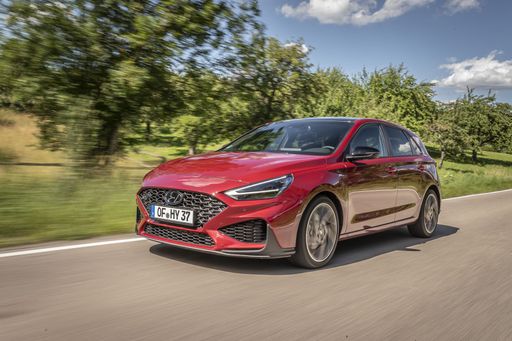
Hyundai i30
Honda HR-V
The Honda HR-V impresses with its sleek design, combining a dynamic exterior with a comfortable and spacious interior. This versatile compact SUV offers a smooth and responsive driving experience, making it ideal for both city commuting and weekend adventures. Equipped with advanced safety features and technology, the HR-V ensures a connected and secure journey for all passengers.
details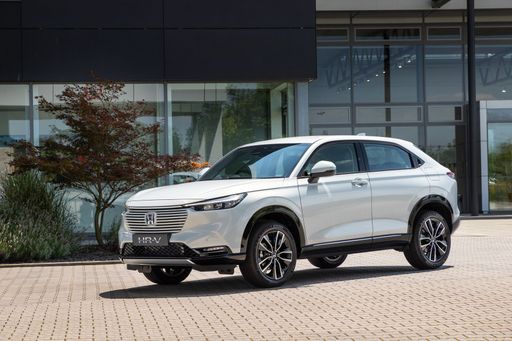 @ hondanews.eu
@ hondanews.eu
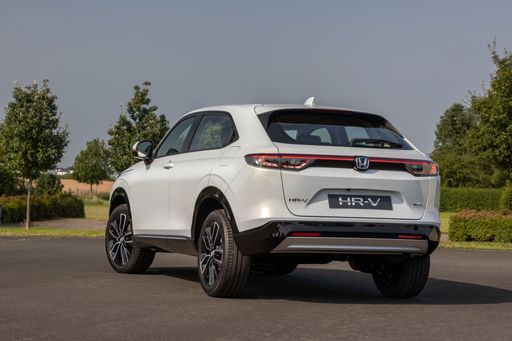 @ hondanews.eu
@ hondanews.eu
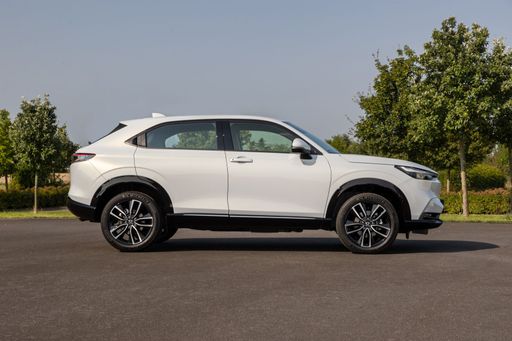 @ hondanews.eu
@ hondanews.eu
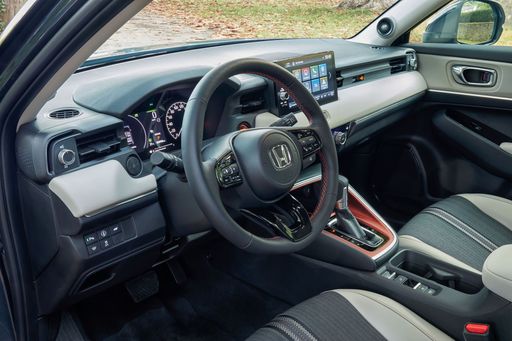 @ hondanews.eu
@ hondanews.eu
Hyundai i30
The Hyundai i30 stands out in the hatchback segment with its sleek design and modern features. It offers a comfortable ride with a well-crafted interior that caters to both driver and passengers. With its emphasis on safety and technology, the i30 provides a balanced driving experience suitable for urban and suburban environments.
details @ hyundai.news
@ hyundai.news
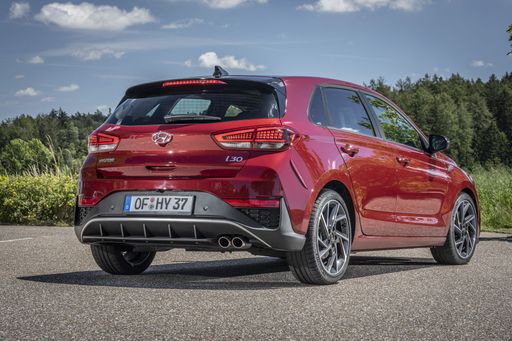 @ hyundai.news
@ hyundai.news
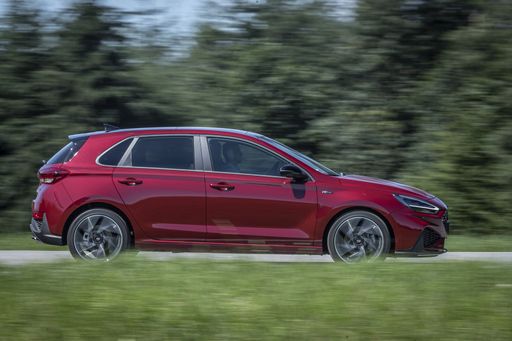 @ hyundai.news
@ hyundai.news
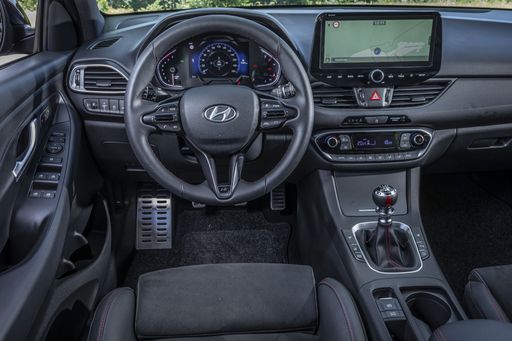 @ hyundai.news
@ hyundai.news
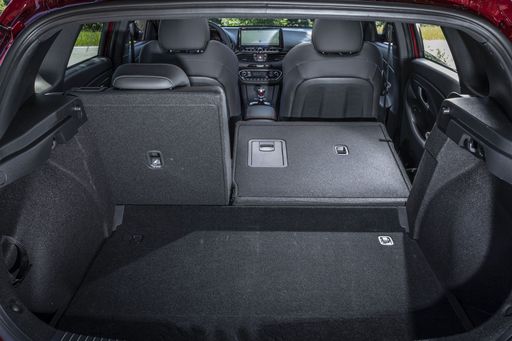 @ hyundai.news
@ hyundai.news

|

|
|
|
|
Costs and Consumption |
|
|---|---|
|
Price
29700 - 35400 £
|
Price
24000 - 29300 £
|
|
Consumption L/100km
5.40 L
|
Consumption L/100km
5.7 - 6 L
|
|
Consumption kWh/100km
-
|
Consumption kWh/100km
-
|
|
Electric Range
-
|
Electric Range
-
|
|
Battery Capacity
-
|
Battery Capacity
-
|
|
co2
122 g/km
|
co2
130 - 136 g/km
|
|
Fuel tank capacity
40 L
|
Fuel tank capacity
50 L
|
Dimensions and Body |
|
|---|---|
|
Body Type
SUV
|
Body Type
Hatchback
|
|
Seats
5
|
Seats
5
|
|
Doors
5
|
Doors
5
|
|
Curb weight
1452 kg
|
Curb weight
1291 - 1407 kg
|
|
Trunk capacity
319 L
|
Trunk capacity
395 L
|
|
Length
4355 mm
|
Length
4340 mm
|
|
Width
-
|
Width
1795 mm
|
|
Height
1582 mm
|
Height
1455 mm
|
|
Max trunk capacity
1289 L
|
Max trunk capacity
1301 L
|
|
Payload
418 kg
|
Payload
463 - 509 kg
|
Engine and Performance |
|
|---|---|
|
Engine Type
Full Hybrid
|
Engine Type
Petrol, Petrol MHEV
|
|
Transmission
Automatic
|
Transmission
Manuel, Automatic
|
|
Transmission Detail
CVT
|
Transmission Detail
Manual Gearbox, Dual-Clutch Automatic
|
|
Drive Type
Front-Wheel Drive
|
Drive Type
Front-Wheel Drive
|
|
Power HP
131 HP
|
Power HP
100 - 140 HP
|
|
Acceleration 0-100km/h
10.6 - 10.8 s
|
Acceleration 0-100km/h
9.6 - 13.1 s
|
|
Max Speed
170 km/h
|
Max Speed
178 - 197 km/h
|
|
Torque
253 Nm
|
Torque
172 - 253 Nm
|
|
Number of Cylinders
4
|
Number of Cylinders
3 - 4
|
|
Power kW
96 kW
|
Power kW
74 - 103 kW
|
|
Engine capacity
1498 cm3
|
Engine capacity
998 - 1482 cm3
|
General |
|
|---|---|
|
Model Year
2025
|
Model Year
2024
|
|
CO2 Efficiency Class
D
|
CO2 Efficiency Class
D, E
|
|
Brand
Honda
|
Brand
Hyundai
|
What drive types are available for the Honda HR-V?
The Honda HR-V is available as Front-Wheel Drive.
The prices and data displayed are estimates based on German list prices and may vary by country. This information is not legally binding.
